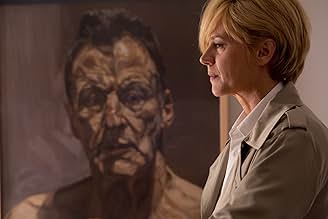AVALIAÇÃO DA IMDb
7,1/10
35 mil
SUA AVALIAÇÃO
Depois de um encontro casual, uma mulher de coração partido decide confrontar sua vida e os eventos mais importantes sobre sua filha encalhada.Depois de um encontro casual, uma mulher de coração partido decide confrontar sua vida e os eventos mais importantes sobre sua filha encalhada.Depois de um encontro casual, uma mulher de coração partido decide confrontar sua vida e os eventos mais importantes sobre sua filha encalhada.
- Direção
- Roteiristas
- Artistas
- Indicado para 1 prêmio BAFTA
- 14 vitórias e 62 indicações no total
Darío Grandinetti
- Lorenzo
- (as Dario Grandinetti)
Ramón Agirre
- Inocencio - portero
- (as Ramón Aguirre)
- Direção
- Roteiristas
- Elenco e equipe completos
- Produção, bilheteria e muito mais no IMDbPro
Avaliações em destaque
My interest in Almodovar is rather muted. He doesn't excel in any of the ways of presenting the world that really matter to me but he does several things more than well, so every so often I visit. There is the desire to submerge ourselves in fiction, lose ourselves to self in order to wake to a fabric that extends from self. That's Talk to Her for me.
But like Woody Allen or the Coens, he has consistently worked for so long on the same motifs that coming to him is also a matter of is he particularly inspired that day. I'm pleased to say he is.
In the individual pieces of cinematic craft, this is not particularly exceptional. If you're heavily inclined to how story resolves drama, you will see here something that simply trails off near the end. The symbolic motifs greet us upfront; a deer in slow-motion, tumultuous sea out the window. His bright reds on walls and the like are not something I can get excited about, in this or any film.
But he is inspired today on the fundamental matter of self passing through self. He manages to do this with just a few strands of narrative. There is the young woman who was on her way to all life ahead of her that night on the train, who finds herself yanked by unexpected passion. There is the house of passion in the small fishing village, eerily explored with Hitchcock hues. And there is bewildering loss as she wanders away a widowed mother.
Above all I love here the sense of transition. Almodovar does so well - his actress helps - in spinning narrative to explore tragedy. He says enough about the jittery urge for adventure as a story we throw ourselves in so that we can infer more fleeting illusion around the crushing melodrama about life breaking down. She's not just this grieving woman that another film, say, in the realist format would have simply followed around Madrid; we're privy to all this richness of her young self having set off in search. Things couldn't have only worked this way for her, it's important to see; but sometimes they do, sometimes setting out for open sea means finding yourself marooned on an island, nothing right or wrong.
And Almodovar is ineluctably Spanish, meaning Catholic; so communion with the fleeting, transcendent stuff must take place firmly within ritual, in his case (just like Ruiz before) fiction. The whole is narrated by an author writing the story down as she waits in her apartment, shifting us forward and back. It speaks about the imaginative mind being burdened by the narratives of memory. For Almodovar, there is merit in the effort. Had she not stayed behind to write, she would have missed the letter. Even more pertinently for me, there is a bedridden mother (a mirrored woman) who is allowed to languish in her room, written off as an invalid. But when her daughter comes to visit, the recognition nourishes her back to her feet.
But like Woody Allen or the Coens, he has consistently worked for so long on the same motifs that coming to him is also a matter of is he particularly inspired that day. I'm pleased to say he is.
In the individual pieces of cinematic craft, this is not particularly exceptional. If you're heavily inclined to how story resolves drama, you will see here something that simply trails off near the end. The symbolic motifs greet us upfront; a deer in slow-motion, tumultuous sea out the window. His bright reds on walls and the like are not something I can get excited about, in this or any film.
But he is inspired today on the fundamental matter of self passing through self. He manages to do this with just a few strands of narrative. There is the young woman who was on her way to all life ahead of her that night on the train, who finds herself yanked by unexpected passion. There is the house of passion in the small fishing village, eerily explored with Hitchcock hues. And there is bewildering loss as she wanders away a widowed mother.
Above all I love here the sense of transition. Almodovar does so well - his actress helps - in spinning narrative to explore tragedy. He says enough about the jittery urge for adventure as a story we throw ourselves in so that we can infer more fleeting illusion around the crushing melodrama about life breaking down. She's not just this grieving woman that another film, say, in the realist format would have simply followed around Madrid; we're privy to all this richness of her young self having set off in search. Things couldn't have only worked this way for her, it's important to see; but sometimes they do, sometimes setting out for open sea means finding yourself marooned on an island, nothing right or wrong.
And Almodovar is ineluctably Spanish, meaning Catholic; so communion with the fleeting, transcendent stuff must take place firmly within ritual, in his case (just like Ruiz before) fiction. The whole is narrated by an author writing the story down as she waits in her apartment, shifting us forward and back. It speaks about the imaginative mind being burdened by the narratives of memory. For Almodovar, there is merit in the effort. Had she not stayed behind to write, she would have missed the letter. Even more pertinently for me, there is a bedridden mother (a mirrored woman) who is allowed to languish in her room, written off as an invalid. But when her daughter comes to visit, the recognition nourishes her back to her feet.
Not Almodovar's best film, but also far from his weakest. This character study/mystery/melodrama has hints of both Douglas Sirk and even Hitchcock in its beautiful look, production design, and score, even if it's story is more wispy than most films by those old masters.
Julieta is a classy, attractive middle-aged woman, living seemingly happily with a successful writer, when she encounters an old friend of her daughter's. The friend tells Julieta of running into the girl while traveling – not knowing the daughter disappeared many years ago, a loss that left Julieta emotionally destroyed.
Julieta abruptly decides to break up with her current man, and live alone to try and deal with the re-awakened grief she had finally managed to tamp down. She writes the story of her adult life and loves – which led to her loss – as a sort of goodbye (perhaps suicide?) letter/diary to her daughter that she knows will probably never be read.
The story is always interesting, and the performances are generally quite strong (with one glaring exception in Rossy De Palma's over the top villain-y maid, who seems like she's stepped out one of Almodovar's far less subtle, more campy stories). But while the characters are going through tempests of great emotion, the film kept me cool, removed and observational. That's no crime, but it did keep it from being a powerful experience -- it ended up being an 'interesting and stylish' one instead. Almodovar has said he intended the film to be seen twice, so one can re-see the scenes understanding the film's later revelations, and as admire his work I'm willing to give it that chance and see if that deepens the experience.
Julieta is a classy, attractive middle-aged woman, living seemingly happily with a successful writer, when she encounters an old friend of her daughter's. The friend tells Julieta of running into the girl while traveling – not knowing the daughter disappeared many years ago, a loss that left Julieta emotionally destroyed.
Julieta abruptly decides to break up with her current man, and live alone to try and deal with the re-awakened grief she had finally managed to tamp down. She writes the story of her adult life and loves – which led to her loss – as a sort of goodbye (perhaps suicide?) letter/diary to her daughter that she knows will probably never be read.
The story is always interesting, and the performances are generally quite strong (with one glaring exception in Rossy De Palma's over the top villain-y maid, who seems like she's stepped out one of Almodovar's far less subtle, more campy stories). But while the characters are going through tempests of great emotion, the film kept me cool, removed and observational. That's no crime, but it did keep it from being a powerful experience -- it ended up being an 'interesting and stylish' one instead. Almodovar has said he intended the film to be seen twice, so one can re-see the scenes understanding the film's later revelations, and as admire his work I'm willing to give it that chance and see if that deepens the experience.
I found Julieta to be interesting at the very least. The story has a smooth flow and My whole attention was within the movie. I was trying to grasp everything the characters said while enjoying the visuals and the score.
Technically, this is probably Almadovar's best work. The scenery and camera work is beautiful. The colors please the eye. The score in the background is always in the right tone. Aiding to the smooth transitions within the movie. The cast is excellent. I understood clearly who each character is.
The main theme of Julieta is the relationship between a mother and her child. And that some things we understand as we grow older, with our life experience. This is a recurring theme in Almadovar's movies ('High Heels', 'Volver') but it is set upon a different set of characters with different virtues and faults. And of course a different story.
The plot is imperfect but it is very interesting nonetheless. I didn't fall in love with the characters of Julieta like it was in 'All about my mother' - and this is the main reason I didn't rate it higher - but I still felt their human side. And on the upside, there were no annoying or boring characters either.
People write about a new Almadovar. Well, for me it was a bit of misleading. I saw the director's signature elements through the whole movie. I'm talking about the camera shots, the low amount of people on set, the gradual revelation of events so when the credits roll the viewer knows all that happened explaining all the references made. It is less extravagant then some of his other work, but it is definitely not his first in being such.
Technically, this is probably Almadovar's best work. The scenery and camera work is beautiful. The colors please the eye. The score in the background is always in the right tone. Aiding to the smooth transitions within the movie. The cast is excellent. I understood clearly who each character is.
The main theme of Julieta is the relationship between a mother and her child. And that some things we understand as we grow older, with our life experience. This is a recurring theme in Almadovar's movies ('High Heels', 'Volver') but it is set upon a different set of characters with different virtues and faults. And of course a different story.
The plot is imperfect but it is very interesting nonetheless. I didn't fall in love with the characters of Julieta like it was in 'All about my mother' - and this is the main reason I didn't rate it higher - but I still felt their human side. And on the upside, there were no annoying or boring characters either.
People write about a new Almadovar. Well, for me it was a bit of misleading. I saw the director's signature elements through the whole movie. I'm talking about the camera shots, the low amount of people on set, the gradual revelation of events so when the credits roll the viewer knows all that happened explaining all the references made. It is less extravagant then some of his other work, but it is definitely not his first in being such.
Pedro Almodovar's 2oth feature film being an engaging and thought-provoking melodrama dealing with a middle age woman , Emma Suarez , living in Madrid with her sweetheart , Dario Grandinetti , about to move towards Lisboa . She , then , decides to stay only in Madrid to take on her existence and the most essential deeds about her missing daughter , Priscila Delgado . Julieta begins to record by writing her sad memories when she was a teen : Adriana Ugarte , and how she meets a fisher, Daniel Grao , and falls for him .
Interesting and agreeable melodrama by Almodovar with plenty of passions , tragedy , love , death and twists . Being based on 3 stories by Alice Munro titled : Chance, Soon and Silence from her collection Runaway . Including great performances from main cast as Emma Suárez and Adriana Ugarte . Attractive as well as sensational support cast with plenty of Almodovar familiar faces , such as : Dario Grandinetti, Rossi De Palma in her seventh collaboration , along with others as Daniel Grao , Imma Cuesta, Natalie Poza , Michelle Jenner , Susi Sánchez , Joaquin Notario and Pilar Castro . Sensitive and enjoyable soundtrack by Oscar Winner Alberto Iglesias , Almodovar regular. Colorful and evocative cinematography by cameraman Jean Claude Larrieu and a lot of frames contains the Red color.
La motion picture was well directed by Pedro Almodovar in his usual style, being produced by his brother Agustin Almodovar and their production company , El Deseo . This is Almodovar return to women's drama which he has not directed on since Volver . Almodovar is considered to be one of the best fimmakers of the film history . He has got a lot of hits with dramatic films as Talk to her , Volver , The flower of My secret , The sin I live in, Abrazos rotos , Carne Trémula, Tacones Lejanos , Ley Del Deseo , Que he hecho yo para merecer esto , Matador ! , but also has made comedies as Women on the edge of breakdown , Kika , Laberinto de pasiones , I am so excited and Pepi Lucia Bom. Rating : 7/0 . Better than average . The pic will appeal to Pedro Almodovar followers.
Interesting and agreeable melodrama by Almodovar with plenty of passions , tragedy , love , death and twists . Being based on 3 stories by Alice Munro titled : Chance, Soon and Silence from her collection Runaway . Including great performances from main cast as Emma Suárez and Adriana Ugarte . Attractive as well as sensational support cast with plenty of Almodovar familiar faces , such as : Dario Grandinetti, Rossi De Palma in her seventh collaboration , along with others as Daniel Grao , Imma Cuesta, Natalie Poza , Michelle Jenner , Susi Sánchez , Joaquin Notario and Pilar Castro . Sensitive and enjoyable soundtrack by Oscar Winner Alberto Iglesias , Almodovar regular. Colorful and evocative cinematography by cameraman Jean Claude Larrieu and a lot of frames contains the Red color.
La motion picture was well directed by Pedro Almodovar in his usual style, being produced by his brother Agustin Almodovar and their production company , El Deseo . This is Almodovar return to women's drama which he has not directed on since Volver . Almodovar is considered to be one of the best fimmakers of the film history . He has got a lot of hits with dramatic films as Talk to her , Volver , The flower of My secret , The sin I live in, Abrazos rotos , Carne Trémula, Tacones Lejanos , Ley Del Deseo , Que he hecho yo para merecer esto , Matador ! , but also has made comedies as Women on the edge of breakdown , Kika , Laberinto de pasiones , I am so excited and Pepi Lucia Bom. Rating : 7/0 . Better than average . The pic will appeal to Pedro Almodovar followers.
I'm a big fan of Almodóvar's work, his movies follow my life since I was a teenager, I always adore his early work, movies like "Kika", "High heels" and "Women on the Verge of a Nervous Breakdown" are still considered by me as the height of his career - a bizarre comedy- dramas with a kinky side and raw edges.
in the late 90's Almodóvar became famous worldwide with movies such as "live flesh" "all about your mother" and "talk to her" a melodramatic movies that touched us with a unique approach and vivid colors.
this movie is similar to his big successful movies from the late 90s: the women are in the center of the story where the men pushed aside, there is still a melodramatic approach and lots of mysteries that similar to an onion, piled up slowly, layer by layer until the very end of the movie. the colors are vivid like most of his movies, especially the red color, a sign of passion for Almodóvar, just like his Characters who drive themselves by their total passion to life and love.
so, is that movie good? if you want to compare it to his best and famous work - "all about your mother" and "talk to her" then this movie will lose the fight, it's less sophisticated and the plot has less twists, but still it's a good movie with a touching plot, good acting and a great director who hasn't lost his touch.
in the late 90's Almodóvar became famous worldwide with movies such as "live flesh" "all about your mother" and "talk to her" a melodramatic movies that touched us with a unique approach and vivid colors.
this movie is similar to his big successful movies from the late 90s: the women are in the center of the story where the men pushed aside, there is still a melodramatic approach and lots of mysteries that similar to an onion, piled up slowly, layer by layer until the very end of the movie. the colors are vivid like most of his movies, especially the red color, a sign of passion for Almodóvar, just like his Characters who drive themselves by their total passion to life and love.
so, is that movie good? if you want to compare it to his best and famous work - "all about your mother" and "talk to her" then this movie will lose the fight, it's less sophisticated and the plot has less twists, but still it's a good movie with a touching plot, good acting and a great director who hasn't lost his touch.
Você sabia?
- CuriosidadesAll the sculptures made by Ava are in reality made by Miquel Navarro, a well known artist from Spain.
- Erros de gravaçãoWhen the train does an emergency brake and luggage and people are being tossed all over the place a coffee cup and coffee pot in front of the main character remains undisturbed.
- ConexõesFeatured in Fandor: The High Art of Pedro Almodóvar's Camp (2018)
- Trilhas sonorasPlaying the Piano 2009
Written and Performed by Ryuichi Sakamoto
Principais escolhas
Faça login para avaliar e ver a lista de recomendações personalizadas
- How long is Julieta?Fornecido pela Alexa
Detalhes
Bilheteria
- Orçamento
- € 1.350.000 (estimativa)
- Faturamento bruto nos EUA e Canadá
- US$ 1.490.948
- Fim de semana de estreia nos EUA e Canadá
- US$ 64.044
- 25 de dez. de 2016
- Faturamento bruto mundial
- US$ 22.521.904
- Tempo de duração1 hora 39 minutos
- Cor
- Mixagem de som
- Proporção
- 1.85 : 1
Contribua para esta página
Sugerir uma alteração ou adicionar conteúdo ausente


![Assistir a Tráiler [OV]](https://m.media-amazon.com/images/M/MV5BYTZiMjRjZWMtM2NmMC00MTNmLWJhMTAtMmJkYjgxNjk3YWVhXkEyXkFqcGdeQXRodW1ibmFpbC1pbml0aWFsaXplcg@@._V1_QL75_UX500_CR0)






































